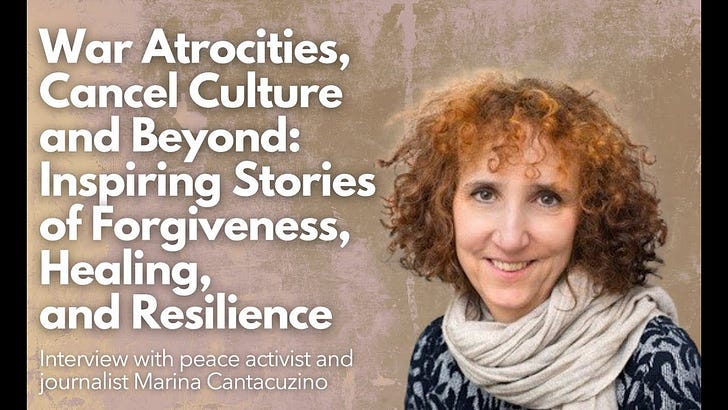War Atrocities, Cancel Culture, and Beyond—Deeply Inspiring Stories of Forgiveness and Healing
What does it mean to heal and forgive, in the face of the unspeakable? Or in the face of toxic cycles of dehumanization and polarization in society?
Like, subscribe, and share your experiences and reflections in the comment section!
For us to transform as a society, we have to allow ourselves to be transformed as individuals. And for us to be transformed as individuals, we have to allow for the incompleteness of any of our truths and a real forgiveness for the complexity of human beings and what we’re trapped inside of. — Angel Kyodo Williams, social justice activist and Zen priest
In the wake of the tragic events of 9/11, Phyllis Rodriguez and Aicha el-Wafi lost both of their sons. For Phyllis, her son was killed in the attacks on the World Trade Center. For Aicha, her son sits in jail for the rest of his life after being charged with conspiracy in connection with the attacks. Although Aicha’s son was an Islamic extremist, there is no evidence to suggest he knew anything about the attacks.
When Phyllis and Aicha met at a meeting supporting families impacted by the 9/11 attacks, they immediately fell into each other’s arms and cried for a long time. This gave birth to an unexpected, profound friendship that transcended cultural and religious divides. As Phyllis says in her story, “meeting Aicha gave me strength and took away my anger and bitterness.”
What does it mean to heal and forgive, in the face of the unspeakable? Or in the face of toxic cycles of dehumanization and polarization in society?
This question is at the core of The Forgiveness Project, which explores the power of human resilience and meaningful remedies to end the cycles of war and violence in our world. Recently, I had the honor of interviewing the founder of The Forgiveness Project, journalist and peace activist Marina Cantacuzino.
From gang members on opposites sides of the game to countless victims and perpetrators of war and genocide, her organization has collected hundreds of inspiring stories of people who are finding freedom and profound healing—even in the most challenging and morally complicated of circumstances. Now, Marina has written her third book on forgiveness: Forgiveness: An Exploration.
Marina suggests that “forgiveness is multifaceted, multidimensional, easily misunderstood, open to interpretation, not always welcome, and not always appropriate.” Yet if forgiveness is a choice, and not a prescription, the stories of the people who have chosen to forgive serve as powerful examples of what’s possible. As Holocaust survivor Eva Kor courageously realized, “I believe with every fibre of my being that every human being has the right to live without the pain of the past.”
Explore more inspiring resources related to this important topic:
Archive of inspiring news article summaries on healing our relationships and social divides.
Archive of inspiring news article summaries on repairing our criminal justice system.
A stirring film features powerful human stories of those living in war-torn areas, particularly the first 35 minutes. This film is part of a deeply moving series called HUMAN by filmmaker Yann Arthus-Bertrand, who spent three years collecting real-life stories from thousands of people in 60 countries. Their stories, although unique to them, speak to the human condition and the parts of life that unite us all: love, happiness, poverty, war, and the future of our planet.
There was a moment when he looked at me, and our eyes met. At that moment, everything else disappeared. There was no sound. There was just two people looking at each other in the eyes. And just for a moment connecting like two human beings in an event that is beyond any of their control. At that moment he wasn’t a terrorist. He was a scared man, and he was asking me for help. From that moment on, the war changed for me. It became a little more scary…. And I started to question decisions more. That scared, crying man peeing himself could be any or all of them. — Caleb, US Soldier (17:25, Human Vol. 2)




Silence. The only remedy for me is silence, the wind in the trees, the sound of a sleeping dog. Now and then a very soft song. All other sounds seems to hurt.